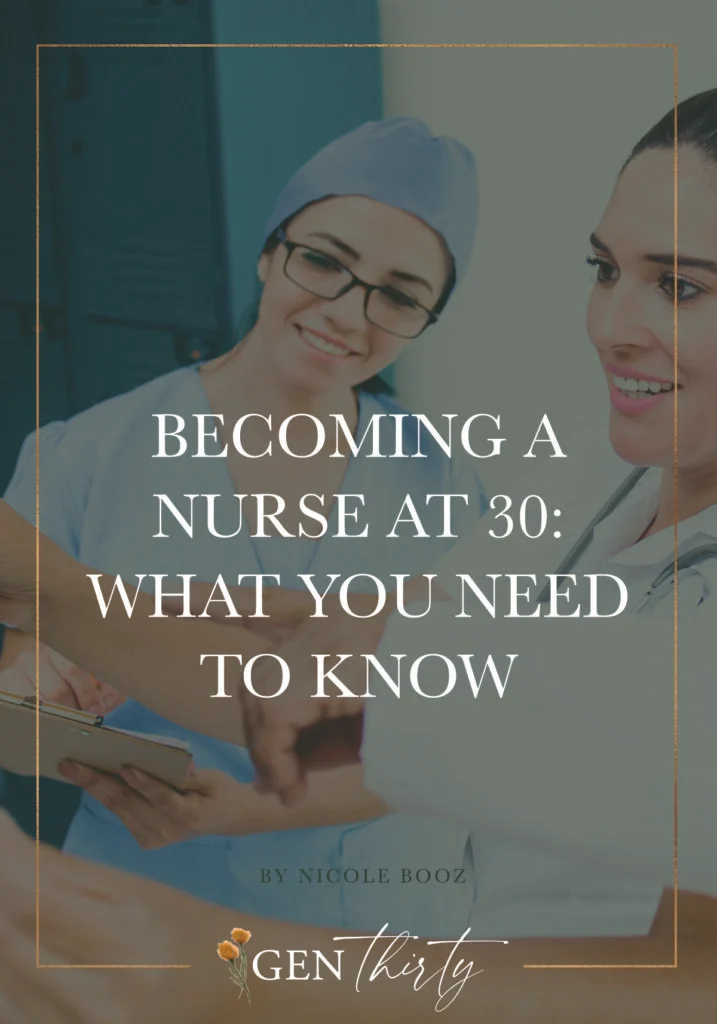If you’re considering a career in nursing but are hesitant because of your age, you’re not alone. A lot of people wonder whether or not it is too late to become a nurse at 30.
Well, the good news is that it isn’t! Just like most things in life, it is never too late to make a change in your life that will push you towards bigger and better things. So don’t be afraid to chase after your dreams no matter how old you are!
Becoming a travel nurse can be an exciting career choice for those looking to combine their passion for nursing with a desire for adventure. Travel nurses have the opportunity to work in various healthcare centers across different countries. If you are wondering how much travel nurses make, you can do your research and take some factors into consideration such as experience, specialty, location, and agency.
But where exactly should you start? That’s where this guide comes in. We’ll explain everything you need to know about changing your career to nursing.
You’ll learn about how to become a nurse at 30 and what you need to keep in mind as you embark on this new career path.
Is it too late to become a nurse at 30?
No, it’s not too late to become a nurse at 30. In fact, many people start pursuing a nursing career later in life.
According to the US Bureau of Labor Statistics, the average age of registered nurses was 52 years old in 2020, up from 51 in 2017.
Nurses who are 65 years or older comprised 19% of the RN workforce in 2020, up from 14.6% in 2017 and 4.4% in 2013. More than half of all RNs today are 50 years or older.
This shows that more and more people are pivoting towards a nursing career as they grow older, which means if you choose to do it in your 30s, not only will you be among like-minded colleagues but also chances are you might be among the youngest!
What’s more, as the nursing shortage continues to grow, there is a high demand for qualified nurses of all ages.
There is no official age limit to becoming a nurse, which is why people in their thirties, forties, fifties, and beyond are applying to nursing schools and getting accepted.
And changing to nursing isn’t the only career change people go through. People become lawyers, actuaries, and more in their 30s.

That said, becoming a nurse in your 30s will take a lot of hard work and dedication.
You will need to attend an accredited nursing program, which can be a CNA, LPN, ADN, or BSN program depending on your goals and qualifications.
You will then need to figure out your financing (for example, you can research financial aid options if you cannot afford the program), then pass the required exams before obtaining your license.
For instance, to obtain a nursing license, you need to pass the NCLEX exam. This exam evaluates the knowledge and skills necessary to practice safely and effectively as an entry-level nurse. To prepare for this exam, you can use different study guides available in online versions.
Another important certification is the TEAS exam, which is designed to evaluate the academic readiness and basic skills of applicants who wish to pursue a career in the healthcare field. Many test preparation resources, including study guides and practice exams, such as Career Employer’s mock tests for the TEAS exam, are available to help you prepare for the exam.
We are going to cover this process in more detail in the next section of this guide.
What is the process of becoming a nurse at 30?
The process of becoming a nurse at 30 is similar to what younger students have to go through. If you have no background in this field, the first step is to decide which type of nursing you want to pursue.
There are several different types of nurses, including but not limited to:
- Advanced Practice Registered Nurse (APRN): APRNs treat and diagnose patients in need, and may prescribe medications. They include nurse practitioners, nurse anesthetists, nurse midwives, and clinical nurse specialists
- Critical Care Nurse: Critical care nurses are registered nurses that work in intensive care units. They care for patients with life-threatening conditions such as trauma, organ failure, or severe infections
- Family Nurse Practitioner (FNP): Family Nurse Practitioners, commonly called FNPs, act as primary care providers for patients. They can perform physical exams, order tests, prescribe medications, and treat common illnesses
- Forensic Nurse: Forensic nurses work with victims of violence, abuse, or crime. They collect evidence, document injuries, and provide emotional support to patients
- Health Informatics Nurse Specialist: Health informatics nurse specialists use technology to improve healthcare delivery and outcomes. They design, implement and evaluate information systems that support clinical practice, research, and education
These are just a few of the many different types of nursing specializations that you can opt for. Each of these requires a different level of education and certification.
Once you have a clear idea of what type of nursing you’d like to do, you’ll need to research the educational requirements for your desired choice.
If you’re interested in becoming an RN, you’ll need to complete a nursing program and pass the National Council Licensure Examination (NCLEX-RN) to become licensed.
LPNs and vocational nurses (LVNs) have fewer education requirements but cannot perform as many duties as an RN. Similarly, nurse practitioners have a master’s degree in nursing and additional certification requirements.

Schooling for Nursing
If you don’t have a bachelor’s degree, you can start with an associate’s degree in nursing (ADN) program, which typically takes 2-3 years to complete.
If you already have a bachelor’s degree in another field, you can consider an accelerated BSN program, which usually takes about 1-2 years to complete.
A BSN degree is becoming more in demand in the nursing profession, and it is required for some nursing positions, such as nurse educator and case management.
You may want to research financial aid options such as scholarships, grants, and loans that will help offset the financial burden of a nursing course a bit.
Before applying to your chosen nursing program, it may be a good idea to determine the required prerequisites or exams that you need to take.
For example, some programs require a background in anatomy, physiology, or math courses. Others will need you to take a standardized test like TEAS or HESI.
Once you get to this point, you can now apply to your desired nursing program. You may want to write about your career change in your personal statement as well!
Once accepted, you will have to complete your nursing coursework. In addition to this coursework, you’ll need to also complete clinical hours to gain hands-on experience in patient care. This is usually done in hospitals, clinics, or other healthcare facilities.
With your coursework and clinical rotations out of the way, you can now sit your nursing exam (for example, the NCLEX-RN exam for RNs) to get licensed and registered.
Generally speaking, you can spend anywhere from 16 months to 4 years before taking your nursing exam.
If you have an ADN, it will take you about 2 years to become a nurse. If you go the BSN route, it will take you about 4 years if you have no degree and a shorter time (varies depending on the institution) if you already have a degree in another field.

What should I keep in mind when becoming a nurse at 30?
Here are a few things that you need to keep in mind before pursuing a career in nursing at 30:
1. Your Previous Career Path
One advantage of becoming a nurse at 30 is that you may have more life experience than younger students.
This can be an asset in the nursing profession. It will allow you to draw on your previous career path and transfer skills into nursing.
For example, if you previously worked in a customer service position, you likely have good communication skills that can translate well to patient care.
2. Transferable Skills
We touched a bit on this in the previous point. There are many skills in other fields that are transferable to nursing.
For example, if you worked in a fast-paced environment, you may be well-suited to working in an emergency department or intensive care unit.
If you previously worked in a management position, you may have skills that are useful in case management.
3. Your Current College Education
If you already have a bachelor’s degree, you may be able to complete an accelerated BSN program. This can save you a lot of time and money.
However, if you do not have a bachelor’s degree, you still have options.
For example, you can start with an ADN program at a community college, which is often more affordable than a four-year university course.
4. Your Nursing School Application
When applying to nursing school, you will need to submit an application, transcripts, and letters of recommendation.
It’s essential to ensure that your application is complete and that you meet all admission requirements.
Note that application requirements may vary depending on the institution you are applying to, so be sure to check that before applying.
5. Taking the Exams
Taking most exams can be stressful. This is no different when it comes to nursing exams like the NCLEX-RN.
However, when you prepare for it adequately, you should be able to pass it on your first try. And if you don’t, you can always take it again.
The good news is that there are many resources available to help you prepare for the exam, including review books, online courses, and study groups.
We will cover these resources in greater detail later on in this guide.
6. Working and Pursuing Nursing
If you plan to work while pursuing your nursing degree, it’s essential to find a job that is flexible and allows you to balance your work and school responsibilities.
Many healthcare facilities also offer part-time and flexible schedules, which can be beneficial for nursing students.

7. Which type of nursing do you want to pursue?
As mentioned earlier, there are many different types of nurses. It is important to consider which type of nursing you want to pursue when starting out.
For example, if you enjoy working with older adults, you might consider becoming a geriatric nurse.
If you’re interested in public health, you might consider working in a community health clinic. Do your research and talk to other nurses to get an idea of what different types of nursing involves.
You might also consider shadowing a nurse in a specific area to see if it’s something you’re interested in.
8. Part-Time Programs
If you’re worried about balancing nursing school with other responsibilities like work or family, you might consider a part-time nursing program.
Many nursing schools offer part-time options, which can allow you to complete your degree at a more manageable pace.
However, keep in mind that part-time programs can take longer to complete. This means you’ll have to balance your coursework with other responsibilities for a longer period of time.
9. Resources For Continuing Education
Continuing education is an important part of nursing. It allows nurses to stay up-to-date on the latest advances in patient care and treatment.
There are many resources available for continuing education, including conferences, workshops, and online courses.
Your employer may offer you opportunities for continuing education. Be sure to take them up on it when they do.
There are also many nursing organizations that offer resources and support for continuing education, such as the American Association of Colleges of Nursing and the National Council of State Boards of Nursing.
10. Personal Challenges to Overcome
Becoming a nurse at any age can be challenging, but there are some specific challenges that older students may face.
For example, you may have to figure out how to manage your time while balancing work and school. You will need to create a schedule that allows you to balance your coursework, clinical hours, and work responsibilities. This may require some sacrifices but it will be worth it in the end.
Another challenge that older students face is managing their finances.
Nursing programs can be expensive, and many students rely on student loans to cover the cost of tuition and other expenses. It is important to create a budget and stick to it to avoid getting into serious debt.
If you are concerned about paying for your nursing program, there are resources available to help. Many nursing programs also offer financial aid and scholarships to students who qualify.

Resources for Nurses
Here is a compilation of some great resources that should come in handy for you as you embark on this journey to becoming a nurse:
Exam guides:
- NCLEX Practice Tests: A website that offers free practice tests for nursing students who are preparing for the National Council Licensure Examination (NCLEX), as well as tips and strategies for passing the exam.
- Nurse Plus Academy: A website that provides online courses, flashcards, quizzes, and simulations for nursing students who want to ace their exams and boost their confidence.
- Lippincott PassPoint: An online adaptive learning platform that helps nursing students prepare for the NCLEX by providing personalized feedback, remediation, and practice questions based on their performance.
Career advice:
- ANA Career Center: A website that offers career guidance, job opportunities, resume tips, and professional development resources for nurses of all levels and specialties.
- AllNurses: A website that features nursing articles, job listings, discussion forums, and networking opportunities for nurses and nursing students.
- Nursing Jobs: A website that helps nurses find jobs in various settings and locations around the world, as well as offering career advice and salary information.
Research reports:
- Lippincott NursingCenter: A website that provides access to over 70 peer-reviewed nursing journals, evidence-based practice guidelines, clinical updates, and continuing education modules.
- Sigma Repository: An online repository that collects and disseminates nursing research from Sigma Theta Tau International Honor Society of Nursing members and partner organizations.
- Cochrane Library: A collection of databases that contain high-quality systematic reviews, clinical trials, health technology assessments, and other sources of reliable evidence for healthcare decision-making.
Blogs:
- Nurse.org Blog: A blog that covers topics such as nursing education, career development, lifestyle tips, personal stories, and current issues in nursing.
- The Nerdy Nurse Blog: A blog that explores topics such as nursing informatics, technology trends, leadership skills, patient advocacy, and nurse entrepreneurship.
- The Gypsy Nurse Blog: A blog that provides information and support for travel nurses, such as destination guides, housing options, tax advice, and travel tips.
Podcasts:
- FreshRN Podcast: A podcast that offers practical advice and insights for new graduate nurses who are transitioning from school to practice.
- Good Nurse Bad Nurse Podcast: A podcast that tells stories of good and bad nurses. It also discusses ethical dilemmas, legal issues, and current events in nursing.
- The Nurse Keith Show Podcast: A podcast that provides holistic career coaching, motivation, and inspiration for nurses who want to advance their careers and achieve their goals.
Final Thoughts on Becoming a Nurse In Your 30s
As you can see, it is not too late to become a nurse at 30. While you may encounter some challenges as you work towards your goal (such as balancing work and family obligations), there are many advantages to pursuing a nursing career later in life.
As an older student, you offer a wealth of life experience, empathy, and professionalism to the profession. And just like many other older individuals who are choosing to pivot into nursing as a second career, you’ll find that it is an extremely rewarding and fulfilling job.
With the demand for healthcare professionals increasing, there has never been a better time to consider a career in nursing. So if you have been thinking about becoming a nurse at 30 or even later than that, don’t let your age hold you back.
You can still achieve your dreams and make a difference in the lives of others!
